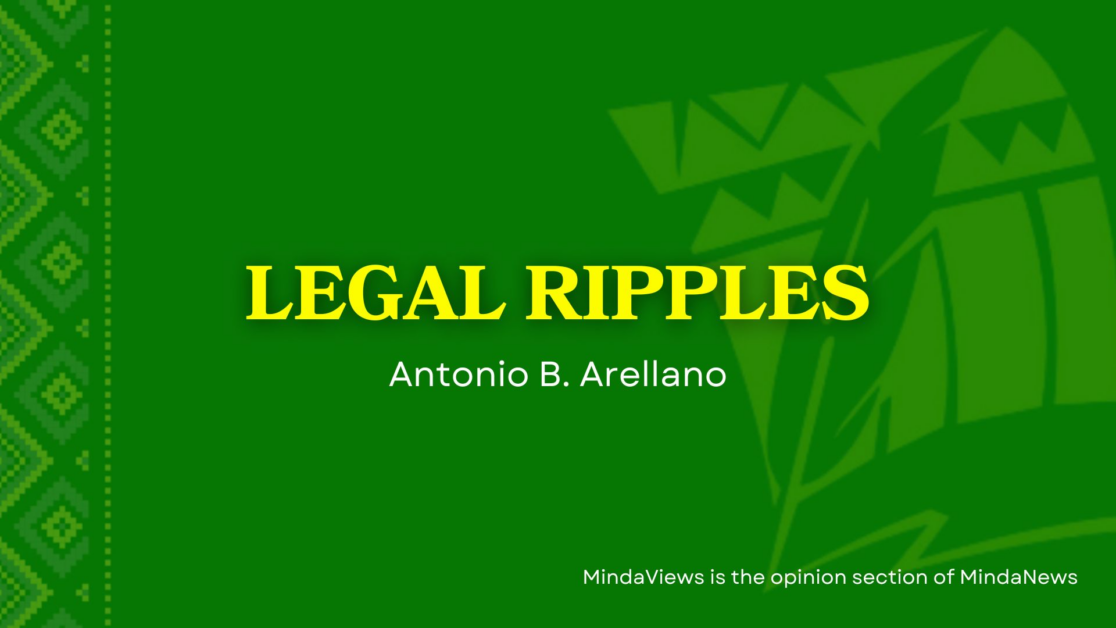
DAVAO CITY (MindaNews / 11 January) — Last January 6, 2024, Liberal Party President Edcel Lagman, Representative of the 1st district of Albay, issued a press statement on Charter Change via People’s Initiative launched by Congressmen from the supermajority coalition using People’s Initiative as a mode of amending the Constitution.
Lagman raised among others, three basic questions: who is the mastermind of the campaign; what are the proposed amendments to be pursued; how can the System of Initiative on the Constitution be used as the mode to amend the Constitution when in the case of “Santiago vs. Comelec” (G.R. No. 127325), the Supreme Court already held that the present law on Initiative (RA No. 6735) is incomplete and inadequate as far as Initiative on the Constitution is concerned and that to date, the remedial legislation meant to address this oversight has yet to be enacted by Congress in compliance with the constitutional directive requiring Congress to provide for its implementation through the enactment of the enabling law.
Since these constitutional and legal parameters governing constitutional changes under the rules enshrined in the 1987 Constitution, parameters the incumbent legislators of the super-majority coalition are presumed to know, why then did they proceed to commence this initiative on the Constitution?
The answer to this nagging question can readily be discovered by simply reading the wordings of the constitutional amendment they proposed to be presented to the people for approval in this Initiative. As printed in the Petition itself, the proposed amendment appertains to:
Art. XVII on Amendments or Revisions, particularly Section 1 (1) which provides that “Any amendment to or revision of this Constitution may be proposed by: (1) The Congress, upon a vote of three-fourths of all its Members;”
This crucial provision is silent on how the voting shall be done: should it be by “Voting Jointly” or “Voting Separately”?
This is where the House of Senate and the House of Representatives cannot come to an agreement for obvious reasons, with the latter House having the strategic reason to push for joint voting.
Still the constitutional roadblock remains: the Supreme Court Ruling in Santiago must first be removed before the Initiative on the Constitution on the proposed amendment can be operationalized. Since the gathering of signatures for the Initiative Petition is already rolling nationwide, those who oppose it will have no other recourse but go to court. Particularly the Supreme Court.
This is precisely what the Initiative authors have in mind – bring the issue to the Supreme Court with prayer for the reversal of the Santiago Ruling. If they will succeed, the Initiative can proceed to the advantage of the supermajority coalition who can effectively campaign nationwide for the “Jointly” amendment to get the people’s approval.
Thereafter with the supermajority coalition forces consolidated, they can readily call for Congress to convene as a Constituent Assembly, propose constitutional revisions particularly the shift to a Parliamentary System with its leader crowned as the First Prime Minister and to rule for as long as the coalition forces continue to maintain its majority control of the parliament.
And to borrow the phrase coined by James Carville, the political strategist of Bill Clinton in the US 1992 presidential elections: “It’s not Amendment, it’s Revision Stupid!”
(MindaViews is the opinion section of MindaNews. Lawyer Antonio “Tony” Arellano was a member of the Consultative Committee in 2018 that was mandated to study, conduct consultations, and review the 1987 Constitution and submit its report, recommendations and proposal to the President within six months. He headed the sub-committee to forge ahead reforms on the provisions on National Territory State Policies and Principles, Foreign Affairs, National Security, Public Order and Safety of the proposed federal government.
Arellano spent 24 years at the Department of Justice, from State Prosecutor II in 1991 to Regional State Prosecutor until 2015.
He taught Economics and Law at the Ateneo de Davao University and was one of three Davao City-based human rights lawyers arrested in May 1985 for alleged rebellion and detained until People Power ousted the Marcos dictatorship in February 1986.
He was conferred the Datu Bago Award in 2011, the highest award the Davao City Government bestows on its citizens. He is presently the Dean and Professor of Constitutional Law at the University of Mindanao’s College of Law in Davao City).







